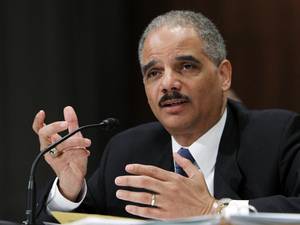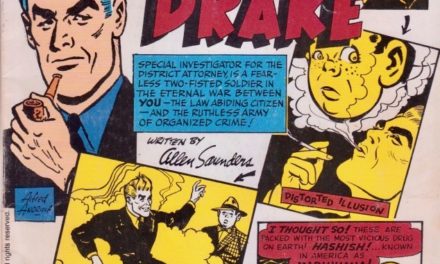By Fred Gardner
All my life I would have sympathized with the Black man being hounded by a vicious Caucasian (who happens to be the richest man in the United States Congress). But watching Attorney General Eric Holder taking verbal abuse from Rep. Darrell Issa last week, all that came to mind were lines by Martin Niemoller, a German Presbyterian pastor who spent seven years in a concentration camp:
First they came for the Socialists, and I did not speak out
Because I was not a Socialist.
Then they came for the Trade Unionists, and I did not speak out
Because I was not a Trade Unionist.
Then they came for the Jews, and I did not speak out
Because I was not a Jew.
Then they came for me
and there was no one left to speak for me.
Eric Holder almost certainly heard or read Niemoller’s famous poem while attending Stuyvesant High School and Columbia University in New York City, where some people to this day can’t forgive “ordinary” Germans for their passivity as the Nazis took power. Maybe at some point it will occur to Holder, “When they came for the potheads, I said ‘Go for it'”
It was on orders from Holder’s office that California’s four U.S. Attorneys on October 7, 2011, announced that they were escalating the federal attack on the medical marijuana movement/industry. We infer from the timing that it was a misdirection play, an attempt to create a distraction just as Holder’s role in the “Fast and Furious” fiasco was becoming a major story.
To cite but one example, on Oct. 6, NPR had run a news segment that its website headlined “Holder Takes Heat Over ‘Fast and Furious’ Scandal.” It began, “Old hands in Washington know it’s never a good sign when the president of the United States has to make a statement like this one. ‘I have complete confidence in Attorney General Holder, in how he handles his office… He has been very aggressive in going after gunrunning and cash transactions that are going to these transnational drug cartels.'”
[Stylebook note: A cartel consists of separate firms colluding to impose high prices. BigPhRMA —Merck, Eli Lilly, Johnson & Johnson, Pfizer, Novartis, Glaxo Wellcome, et al— that’s a transnational drug cartel. The banditos from Sinaloa might not be so murderously desperate if “we” —led by Bill Clinton, who pushed through NAFTA— hadn’t wiped out so many small Mexican farmers in recent years.]
“Fast and Furious” was an operation begun by a Phoenix office of the Bureau of Alcohol, Tobacco and Firearms in 2009 and named after a Vin Diesel movie. A detailed account by Fortune Magazine’s Katherine Eban informs us that there are 853 licensed gun dealers in the Phoenix area. You can buy weapons if you’re over 18 and have no rap sheet —no permit required— and you can legally resell them, thanks to the NRA and “gun rights” advocates. Because there are no federal statutes against such sales, prosecutors are very reluctant to charge many cases the ATF brings them.
In December, 2010, two assault-type rifles that had been purchased 11 months earlier in Phoenix were found near the body of a Border Patrol agent who had been fatally shot. At this point a disgruntled ATF agent named John Dodson charged on CBS evening news that his supervisor (with whom he had been at odds, personally) had ordered him not to arrest the straw buyers because the goal of Fast and Furious was to track the traffickers to Mexico. Dodson provided Sen. Charles Grassley with a letter from his supervisor, Dave Voth, that concluded: “If you don’t think this is fun, you’re in the wrong line of work —period! This is the pinnacle of domestic U.S. law enforcement techniques… Maybe the Maricopa County Jail is hiring detention officers and you can get paid $30,000 instead of $100,000 to serve lunch to inmates all day.”
Grassley denounced Fast and Furious as an insane botch job. The program was halted in January 2011 but the scandal was just beginning. Only about 700 of the more than 2,000 weapons sold under ATF surveillance were ever recovered. Democratic Party apologists noted lamely that F&F was an extension of the “gunwalking” program begun in 2006 under the Bush Administration and dubbed “Operation Wide Receiver.”
In February 2011 Assistant AG Ronald Welch sent a letter to Grassley claiming “ATF makes every effort to interdict weapons that have been purchased illegally and prevent their transportation to Mexico.” Welch eventually wrote another letter to Grassley withdrawing this assertion.
On May 3, 2011, Holder appeared before the House Judiciary Committee, where he was grilled by Rep. Issa. Holder testified, “I’m not sure of the exact date, but I probably heard about Fast and Furious for the first time over the last few weeks.” This is the defense of every craven CEO from Ken Lay to Rupert Murdoch: I was too high up to know what was going on in my organization. Whether it’s true or false, the boss is undeserving of power.
It remains unclear when Holder learned that a high-ranking FBI “asset” in Sinaloa was funding the gun purchases in Phoenix. (Our tax dollars at work!) When the Justice Department publicizes its own investigation of Fast and Furious, you can bet it will call for “better coordination between the agencies involved” or some such sanctimonious bureaucratic jive. They might even create a new Office of Coordination.
The ambitious Issa, who chairs the House Committee on Oversight and Government Reform, kept calling Holder in to testify and focusing public attention on what the Attorney General knew about the missing weapons and when he knew it. On Friday, October 7, 2011 —the very day the California prosecutors held their press conference to announce a crackdown on the medical marijuana industry— Holder wrote Issa a detailed defense of his handling of the Fast and Furious fiasco.
Issa responded, “In your letter Friday, you blamed your staff for failing to inform you about Operation Fast and Furious when they reviewed the memos sent to you last summer. Your staff, therefore, was certainly aware of Fast and Furious over a year ago… It is simply is not believable that you were not briefed on Fast and Furious until a few weeks before your testimony.”
The California prosecutors’ Oct. 7 press conference had been organized hastily by Holder’s top aide, Deputy Attorney General James Cole, and represented a long-sought win for California law enforcement and the DEA. For years they have been straining like German Shepherds on a leash to take down growers and dispensaries. (It’s so much easier and safer to bust hippies in Mendocino than Mexicans in Sinaloa.) The DEA issued a detailed statement Oct. 7 to complement the U.S. attorneys’. It’s likely the decision to sic ’em was intended to win their support —or at least neutralize them and keep them from piling on behind Issa— as Holder fought to save his position. We’d be able to do more than draw inferences if the Drug Policy Reform honchos Back East would provide useful intelligence instead of just whining “Barack Obama broke his promise, bwah bwah bwah.”
Holder’s Nemesis (The Richest Man in Congress)
If you ever heard an ad for an alarm in which a cop-like voice warns “Please step away from the car,” you have heard the voice of Darrell Issa. In 2000 Issa used some of the huge fortune he’d made selling car alarms to secure a seat in Congress from a heavily Republican district in California’s Central Valley. Here are some excerpts from his Wikipedia page, starting with his stint in the service.
Issa… claimed his unit provided security for President Richard Nixon, sweeping stadiums for bombs prior to games in the 1971 World Series, and that he received the highest approval ratings during his service. However, a 1998 investigation by the San Francisco Examiner found these claims were not true, since Nixon had not attended any of that year’s World Series games. The investigation also discovered that Issa was actually transferred to a supply depot after he received an unsatisfactory evaluation…
A fellow soldier, Jay Bergey, claimed that Issa stole his Dodge Charger in 1971, when they were serving together. The day after he confronted Issa, the car was found abandoned on a nearby expressway. Asked about this in 2011, Issa denied it and suggested it was possible that other soldiers stole the car or that Bergey, who he claims had a drinking problem, had abandoned it himself while intoxicated.
After receiving a hardship discharge in 1972, following his father’s heart attack, Issa earned his General Educational Development (GED) certificate and began taking classes at Siena Heights University, a small Catholic college in Adrian, Michigan. He continued his military service by joining in the Reserve Officer Training Corps (ROTC). Twice that year he was arrested. In the first incident he was indicted by a grand jury for an alleged theft of a Maserati, but prosecutors dropped the charge shortly thereafter.[8] In the second incident, he was stopped for driving the wrong way on a one-way street, and a police officer noticed a firearm in his glove compartment. Issa was charged with carrying a concealed weapon; he pleaded guilty to the lesser charge of possession of an unregistered firearm, and was sentenced to six months’ probation and a small fine. Issa has said he believes the record has since been expunged…
After leaving the military, Issa and his second wife, Kathy Stanton, moved back to the Cleveland area, pooled their savings, sold their cars and borrowed $50,000 from his family to invest in Quantum Enterprises, an electronics manufacturer run by a friend from Cleveland Heights that assembled bug zappers, CB radio parts and other consumer products for other companies. One of those clients, car alarm manufacturer Steal Stopper, would become the path to Issa’s fortune. It was struggling badly, and he took control of it by foreclosing a $60,000 loan he had made to it when its founder, Joey Adkins, missed a payment. Adkins remained as an employee. Issa soon turned Steal Stopper around, to the point that it was supplying Ford with thousands of car alarms and negotiating a similar deal with Toyota…
Car theft rose in the United States during the 1980s, and with it the demand for security devices. Rolls Royce, BMW and General Motors joined Ford and Toyota as customers. In 1985 Issa sold the company to a California-based maker of home alarms, and moved to the San Diego suburb of Vista, where he has lived ever since, to work for it. Shortly afterward he left to start Directed Electronics, Inc. (DEI)…
He recorded the “Please step away from the car”, warning for DEI’s signature product, the Viper car alarm. Sales grew from a million dollars its first year to $14 million by 1989. DEI diversified, and eventually became one of the largest makers of aftermarket electronic automotive accessories in the U.S. As of 2004, Directed Electronics was North America’s largest aftermarket automotive electronics manufacturer…
From his involvement in consumer-electronics trade organizations, he began to get politically active. He went to Washington to lobby Congress and became one of California’s largest individual campaign contributors toRepublican candidates. In 1996 he backed the successful campaign to pass Proposition 209, a ballot initiative which prohibitted public institutions in California from considering race, sex, or ethnicity. He was instrumental in persuading the national Republican Party to hold its 1996 convention in San Diego…
Issa’s first campaign for elected office came in 1998, when he sought the Republican nomination for United States Senate to run against incumbent Democrat Barbara Boxer. He backed the campaign with $10 million of his personal wealth, but lost the primary election to California State Treasurer Matt Fong. Fong’s campaign raised $3 million from contributions and complained that Issa’s wealth made for an uneven playing field (Issa had only $400,000 in contributions)…
Issa came to national prominence in 2003 when he contributed over $1.6 million to help fund a signature-gathering drive for the petition to recall Gray Davis. At the time he made the contribution, it was widely believed that Issa intended to place himself on the ballot to replace Davis. However, following the entrance of fellow Republican Arnold Schwarzenegger into the race, two days before the filing deadline, Issa announced that he would not run. Issa later said that his mission had been accomplished since Davis was recalled and he wanted to continue representing his district in Congress and work towards Middle East peace…
He signed the “Taxpayer Protection Pledge” of the Americans for Tax Reform, an organization that opposes all tax increases…
He has endorsed Mitt Romney’s candidacy for the Republican nomination for the 2012 presidential election….
In February 2011, the Watchdog Institute, an independent nonprofit reporting center based at San Diego State University, published an investigation alleging that as leader of the House Committee on Oversight and Government Reform, Issa built a team that included staff members with close connections to industries that could benefit from his investigations…
In April 2008, the Daily News reported that Issa questioned federal expenditures made after 9/11. He was criticized for making comments that the federal government “‘just threw’ buckets of cash at New York for an attack ‘that had no dirty bomb in it, it had no chemical munitions in it'” and asking “why the firefighters who went there and everybody in the city of New York needs to come to the federal government for the dollars versus this being primarily a state consideration.”
In September 2011, the liberal group American Family Voices filed a complaint with the Office of Congressional Ethics against Issa, alleging he had repeatedly used his public office for personal financial gain. Issa’s office rejected the allegations.
That old political adage about your enemy’s enemy being your friend is not true. They can both be your enemies.
Issa (who Holder correctly compares to Sen. Joe McCarthy) is now claiming that the Obama Administration wanted guns to reach Mexico to create an excuse to enact federal gun-control legislation.
The White House has called Issa’s attack on Holder “a distraction” to divert attention from more important matters. It takes one to know one.
Fred Gardner edits O’Shaughnessy’s, the journal of cannabis in clinical practice. He can be reached at editor@os-extra.cannabisclinicians.org.






